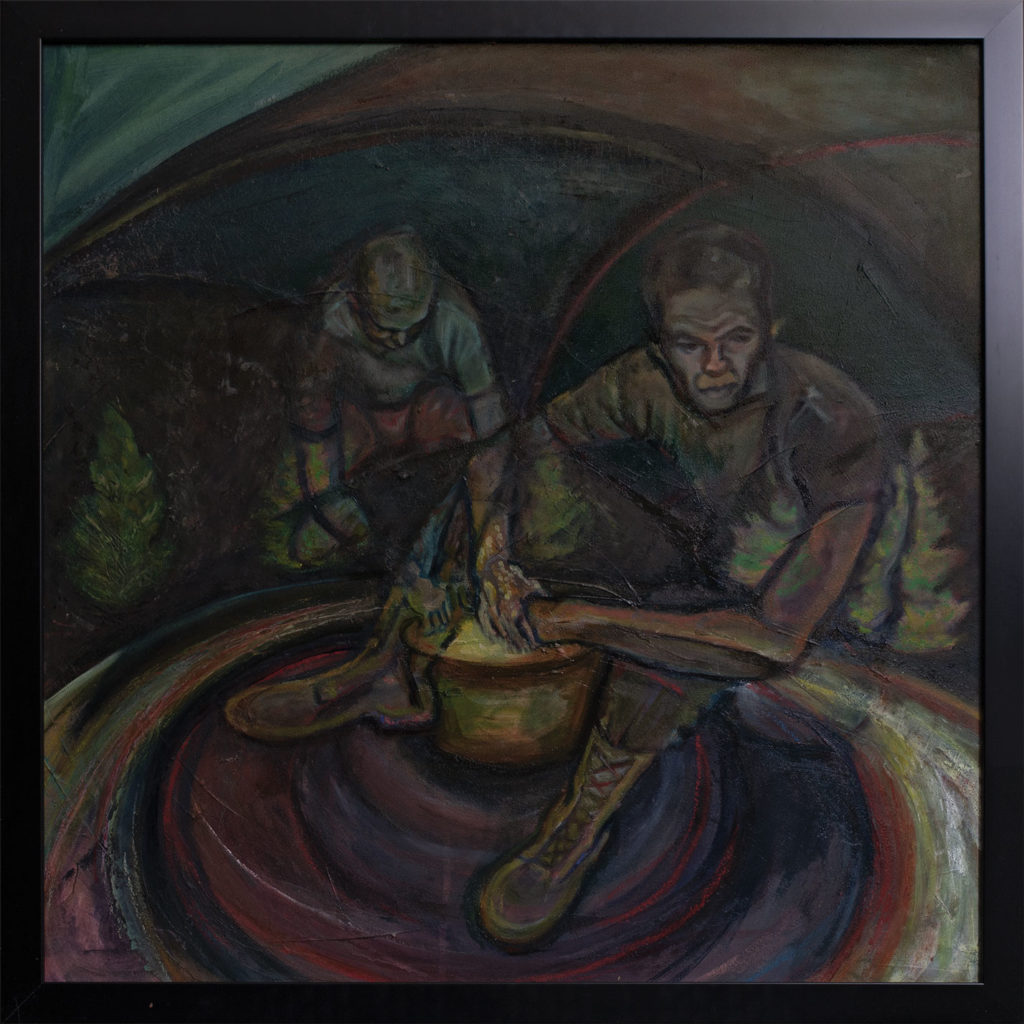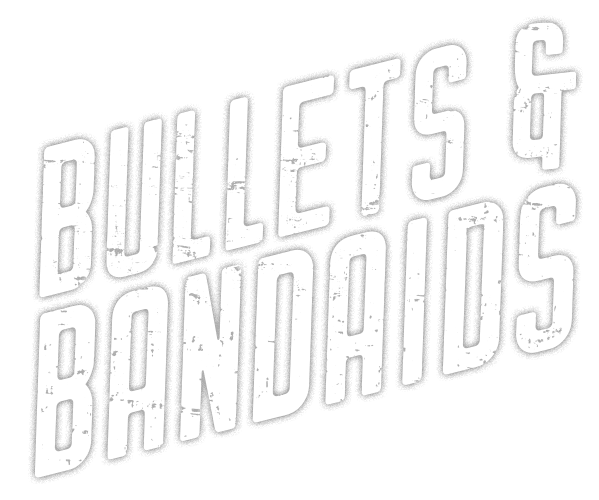
Barb Cherry
24″ x 24″ • oil paint with mix materials
Artist Statement
It has been refreshing to contribute to this organization. I have been making art about subject matter people tend to mentally suppress. It was a great fit being paired with the interview of documentarian Frederick Marx. He has been documenting how many of our veterans are dealing with the trauma experienced while being in the military. I have a belief that it should be standard for individuals to have healing time and mental health support while completing their service. This, I understand, is counter intuitive to the bravo mindset needed to be the soldiers our country utilizes on a steady basis, so I understood Marx’s mention of the “reverse boot camp”.
I find it encouraging to hear there are non-profit organizations for soldiers to have time to sort out the emotions from their extraversion, and it being similar to what our indigenous population used for thousands of years. This is what resonated with me for the oil painting I contributed, ‘Transcend’. I thought of how the United States could use a similar mindset for our veterans, understanding that the duties can be difficult to handle once returning home to their families and friends. I agree with Marx in regard to Bessel van der Kolk’s theories within ‘How the Body Keeps the Score’. It is an excellent resource for understanding how trauma affects our minds and bodies. Our soldiers need acknowledgement and steady mental health care in order to be able to function in their everyday lives, and I was happy to create a visual of this ideal.
Instagram: @thebarbart
by Robert LeHeup
“Every positive change – every jump to a higher level of energy and awareness – involves a rite of passage. Each time to ascend to a higher rung on the ladder of personal evolution, we must go through a period of discomfort, of initiation. I have never found an exception.”
– Dan Millman
For thousands of years we lived in separate cultures, formed through not just the need to survive, but the want to thrive. We came together, bonded by our humanity, to form a protective barrier between us and whatever physical or metaphysical threats may be waiting for us in the shadows. Once these groups agreed on what they held valuable, they created ways to ensure these values were upheld in ways sacred to both person and tribe. They created rites of passage.
This took on many forms, but the end result was always the same. The landmark created through trial and victory was acknowledged and handled with profound respect, not simply for those who were transformed by the fires of hardship, but the holy nature of the fires themselves. It marked progress from childhood to adulthood and facilitated a cultural shift of respect, dignity, and responsibility, not just for the person, but for the culture itself. It allowed a person to know their place in their society and for society to know that person’s place.
Frederick Marx’s remarkable drive to facilitate these rites of passage came from the immense vacuum of their absence he felt as a young man. Like all sons, Frederick thought his father would live forever, the combination of mentor and God, passing on maxims and anecdotes and lessons that feel like secret imperatives to a developing child. Yet at the tender age of nine years old, his father died suddenly of a heart attack. Forty one years old, his momentum creating a solid foundation for the future of himself and those he loved, where the noble efforts to fight for love and light and hope-
Gone.
The father-shaped vacuum left his family aching to heal. Aching to grow in the midst of debilitating tragedy.
On the day of his father’s funeral, Frederick remembers vividly the moment when his uncle put his hand on his shoulder, declaring without knowing the gravity of his words that Frederick was now the “Man of the house.” That moment carved a neural pathway into him, his father’s absence, and all that went with it, forever impossible to replace, slamming like a boulder directly on his nine year old shoulders. This was underscored all the more as he realized no one would stick around to help show him the way.
Bereft of guidance, alone in a masculine society, he began viewing everyone as members of one interconnected family. Maybe to fill the infinite, father-shaped vacuum. Maybe he was simply blessed with wisdom. In time, and with his world view planted in the rich soil of his sense of responsibility, he adopted the conviction that he owed the world his own form of service. Rather than waiting for the moment to come, he used his talents for empathy, as well as his passion for videography, into a career as a documentarian. He would use himself as a filter and projector, bringing all his experiences to bear at any given time.
He recognized how our society had a similar vacuum that he carried, where tribal support and defined rites of passage were replaced with a far more individualist perspective. He saw the impact this ubiquitous social loneliness has and poured himself into addressing it. He saw a remedy in our ability to grow through shared experience, the fulcrum for our ability to thrive, and wanted as many people to witness their shared humanity as possible.
Yet at the start of his thirty ninth year, having become an Emmy nominated documentarian celebrated for his focus on societal landmarks of trial and support and of the universal truths that come with sacrifice, he still hadn’t truly found his own rites of passage. At any given point, he might pause from the day’s tedium, look into himself, and mourn the profound absence of knowing his place in the world. Toward the end of that same year, he went to a weekend workshop with a nonprofit organization called The Mankind Project based out of Chicago. With the support of those participating, and with guidance throughout the process, Frederick was brought into the tribe through rite and ritual. He had found a means of filling that vacuum.
Several years later, having continued with his career and sense of purpose, he was invited to another weekend workshop, this one called “Vets Journey Home.”
This. Was. Defining.
Vietnam veterans, twenty five to thirty years done with their service, were opening their hearts to their nuanced suffering. They shared their demons and how to fight them off, the hardship of noble loneliness when civilians spit in their faces upon return, and rekindled the style of camaraderie veterans can have with other veterans they never met. They spoke of how they continued to add to their country in the form of being EMT, firefighters, or police officers. He saw people of service, great and good, sacrificing themselves yet again to a country that was too fragile or too busy to hear them.
He saw the strength that remained; a strength for which he was now familiar.
Having found a sense of purpose where he is constantly given the opportunity to highlight the value of rites of passage, he began what has now become an ongoing series of documentaries focused on veteran-centric retreats, through his company, Warrior Films. His largest series yet, Veterans Journey Home, shines much needed light on the trials and potential triumphs of our veterans. In the time since he began, the experiences that have been shared with him have been consistently dynamic, impactful, and so eye-opening that the humility that comes with it is similar to that of looking at the stars.
He fully immersed himself into rituals originating hundreds, if not thousands of years. Certain tribes used to use a maze drawn on the ground, where warriors in waiting, otherwise known as members of the tribe, would walk to the center. They would take note of who they were, would place that understanding on the ground in the center of the maze, then take note of the awakening of the warrior they would become by the time they walked back through the maze. Or how warriors fresh from battle might return to their tribe and be led through a series of rituals, sometimes lasting for weeks.
Today our warriors begin with the want to be in the infantry. They have a choice and they build the momentum to join. After that is boot camp, a slight escalation of stress, followed by their infantry school, which ramps up the energy and expectations for all involved. From there they join the actual infantry, where the escalation of challenging experiences can test them to their core, honing their ability to experience the death or dismemberment of not only those on the wrong end of their rifle, but of those that fought next to them. From there is the actual war, where training and what is considered moral high ground are roughly as important as luck. After that, when their time in service is over…
That’s it. It’s just over.
They’re left with however many years of escalating aggression, no direction to focus it, no set standard that can be applied to those they live and work with, and no leadership or even guidance on how to live in a world that has changed as much as they have. All they can do is fit in the box of the drunk, broken knuckle-dragger or the perfect hero, missing only the cape. Is it any wonder so many veterans swear so much?
This also doesn’t include all those veterans traumatized by other circumstances, whether by the outside world or members of their own company, platoon, or even chain of command. Staggering racial disparities, sexual assault, and all manner of other horrible acts that humans bring upon other humans, wrapped up in a nice, tight package. Crushed under the weight of their story not being the sort that people want to hear, the crumbs of what’s left of the offense swept under the rug of an antiquated and systemic corruption.
Yet through the sort of will that inspires people to become veterans, they gather their inner strength and own their traumas, staring into Nietzsche’s abyss with the courage of warriors.
Frederick having the chance to show their personal struggles… to be able to watch their inspiring development into creatures more whole… to feel and know what it is to break through the surface of doubt and shame with a sword sharpened by pain and conviction to be a better human… is arguably divine.
Through his efforts, as well as through those on the opposite end of his camera, we are shown why rites of passage are often considered sacred. We’re given a road map to consciousness, built and maintained by humanity for thousands of years. They are, through the action of sacrifice and a call to service, continuing to forge a path toward our victory over trauma, not simply individually, but as a society. It seems the best way to honor their efforts to make our world better is to help them.
————
You can find out more about Frederick Marx
and Warrior Films at warriorfilms.org.
Facebook: Warrior Films
Facebook: Veterans Journey Home
Twitter: @FrederickMarx
